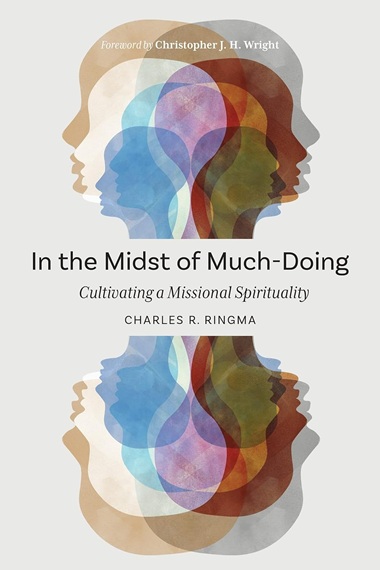 As I have pointed out earlier in this series, missions and missionaries have not received the amount of attention they warrant.
As I have pointed out earlier in this series, missions and missionaries have not received the amount of attention they warrant.
The good news, though, is that many new books are considering the missionary enterprise.
Some authors are still writing missionary biographies (thank you!), but many of the new books are by missiologists and academics who provide many valuable insights into our missionary history and its overlap with colonial enterprises and world Christianity.
Here I will look at seven books by key thinkers who have been devoting themselves to these matters, to very good effect. However, they are not primarily looking backward, but instead are urging those of is in the West to recognize that we are very much in a new era of World Christianity.
A common, and very welcome, theme is that mission derives from the nature of God and his purpose for us. None of these authors would be satisfied with the way missions has been sidelined in so many churches, thought of, if considered at all, as one more possible ministry.
And all, I believe, agree that we need to pay more attention to what God has ordained and be more humble about our own insights.
The first three – Charles Ringma, Michael Goheen and Reg Reimer – even have strong local connections.
- Charles A. Ringma: In the Midst of Much-Doing: Cultivating a Missional Spirituality (Langham Global Library, 2023)
Charles Ringma has worked and taught around the world, and In the Midst of Much-Doing indicates that he has continued to learn and read widely along the way.
From his early days in Australia, where he founded Teen Challenge, to mission work in the Philippines to teaching at Regent College and again in Australia (and more), he has kept busy. (An article in The Other Cheek on the occasion of Ringma being made a member of the Order of Australia last year catalogues his many achievements; not least his 30-plus books.)
In the Middle of Much-Doing allows Ringma to reflect on the busy-ness; he clearly wants to put his journey in perspective, and help others as they choose their path.
In the Preface, he states that his interest in exploring ‘missional spirituality’ – a spirituality that can guide, sustain and empower our Christian witness in the world – was not shaped by his academic work, though that helped him to consider the topic:
Rather, the genesis for this book was formed in the midst of my own unsustainable evangelical activism. which was further complicated by my somewhat compulsive personality. My search for a more sustainable spirituality was also influenced by some unhealthy theological concepts that I inherited from my Reformed tradition – particularly its election anxiety and paramount focus on personal piety, with little attention to nurturing liturgical and communal spiritual practices.
My focus on personal activism was also unwittingly reinforced by naive Western notions about our capacity to change the world because we presume that ‘God is on our side.’ When we take on a calling that is well beyond our capabilities and resources, we may boldly set out to try to make things better in our society while treating God as an onlooker, a boss we are seeking to please or someone who is there simply to cheer us on.
I am drawing on my own story in the beginning of this book to highlight the fact that much of what we seek to do as Western Christians is marked by an activism that is not always gospel-inspired and Spirit-sustained. We foolishly think that the coming of the kingdom of God somehow depends on us!

Charles Ringma was made a member of the Order of Australia last year.
He adds that the book has “a certain ‘edge,'” which results from the fact that it “is more the product of struggle than of calm reflection in a library.”
Nonetheless, there is still a lot of ‘doing’ reflected in the work, which is long (535 pages) and draws on an impressive array of sources.
Here is the purpose of the book, as described by the publisher:
How are we to sustain activism and compassion amidst the never-ending crises of the 21st century? While the concern for social justice is deeply biblical, cynicism, burnout and despair are all too common side effects when action is divorced from contemplation.
To effectively serve as the hands and feet of Jesus, the church must attend to the revitalization of its inner life through the spiritual practices which feed, support, and sustain the work of the kingdom.
Rather than the fragmentation and dualism that have led denominations to choose between prayer and service, evangelization and justice, the church must integrate heart, mind, and body in order to fulfil its calling to transform the world from within.
Drawing from Scripture and a wide range of Christian traditions – from the monastic to the evangelical – this book inspires its readers to integrate spiritual renewal and prophetic witness for the glory of God and the good of his creation.
Though Ringma is very ecumenical in his writing – “I have sought to listen to the biblical narratives and to learn from various theological perspectives, such as the Anabaptists or the liberation theologians, among others” – and has clearly shifted away from some of his early practices, he is not shy of his evangelical heritage. He had Chris Wright, a primary theologian of the Lausanne movement write the Foreword, for example.
There are a number of local commendations (and there were many from around the world) introducing the book:
- Maxine Hancock (Regent College): “This is Ringma’s magnum opus . . .”
- Prabo Mihindukulasuriya (Colombo Theological Seminary, Regent College): “This magnificent book offers us the fruits of a lifetime of scholarship, cross-cultural missionary experience and reflective wisdom that is truly breathtaking.”
- Tim Dickau (Centre for Missional Leadership, CityGate Vancouver): “This book leads us deeper into the life of the triune God, deeper into the rich reservoir of biblical and theological witnesses, deeper into a life of solidarity and action with our poor, oppressed or suffering neighbor, deeper into a life of care for, wonder of and attention to the creation beneath and above us.”
- Ross Hastings (Regent College): “This book is an outstanding and welcome contribution to the growing area of the study of missional spirituality.”
- Paul Stevens (Regent College): This momentous volume sums up a lifetime of Charles Ringma’s personal mission engagement, his teaching interculturally and his extensive research theologically, historically, spiritually, philosophically and practically. . . . The definitive work on the subject!”
Ringma also refers to local people throughout the book, including:
- Mary Dickau, who wrote The Art of Healing Prayer with Ringma;
- Jonathan Wilson on ‘the Genesis Mandate’;
- Ross Hasting for his definition of the missional task of the church’
Go here for a very positive review of In the Midst of Much-Doing by Australian (Catholic) Archbishop of Brisbane Mark Coleridge. And here for a YouTube interview about the book.
- Michael Goheen & Timothy M. Sheridan: Becoming a Missionary Church: Lesslie Newbigin and Contemporary Church Movements (Baker Academic, 2022)
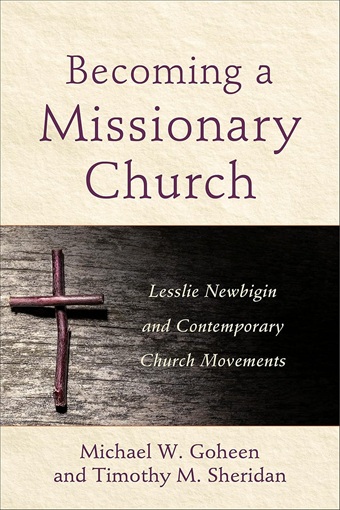 Michael Goheen and Timothy Sheridan begin their book with an invitation to pastors and congregational leaders to learn more about the unique contributions of Lesslie Newbigin as they seek to become a missionary church:
Michael Goheen and Timothy Sheridan begin their book with an invitation to pastors and congregational leaders to learn more about the unique contributions of Lesslie Newbigin as they seek to become a missionary church:
Our primary concern in this book is to hear Lesslie Newbigin’s voice. He is considered by many to be the father of the now widespread concern for the church’s missionary nature. To hear his voice, we do two primary things in this book:
First, we set his missionary understanding of the church in its historical context of the early twentieth century. Second, we set him in dialogue with three important church conversations or movements that have developed his missionary vision – the missional church, the emergent church, and center church.
We do so not by way of a deep dive, either historically or analytically, into these conversations. Rather, we offer our overall sense of the main themes in each conversation and their helpful contributions to a missionary church. But we also reappropriate Newbigin’s voice of critique and enrichment and inject it into each conversation.
Lesslie Newbigin was a missionary, missiologist and ecumenist who served for many years in India before returning with a challenging message for the church in his home country, England. (Go here for a good introduction to the man and his work.)
The publisher writes of the book:
Becoming a Missionary Church offers a historical assessment and balanced critique of contemporary church movements, especially in light of missional ecclesiology.
The authors explain that some of Newbigin’s insights have been neglected and need to be retrieved for the present day. This book calls for the recovery of the missionary nature of the church and commends church practices applicable to any congregation.

Michael Goheen
Reviewing the book for Themelios, Matthew Bennett notes three main subjects of critique:
- Missional Church: “the church has gotten lost or overshadowed in the process of investigating the intersection of the gospel and our culture.”
- Emergent Church: “while Emergents appeal to Newbigin’s sympathy for ecumenism and unity, they abandon his biblical and theological moorings and run headlong into the same theological errors for which he critiqued his peers within the WCC.”
- Tim Keller: “Some of their critique focuses on how Keller gleans much from Newbigin while not adequately giving him credit for the shaping influence he has had on Keller’s thought.”
These are just tastes of the review; go here for the full comment.
Goheen notes on his site:
At times it has been emotionally difficult for us to write this book. There is more criticism in this book than either of us is used to offering in our writing. And these critiques are not just of theological positions but of people who hold those positions, including people we respect and appreciate as brothers and sisters in Christ. But we pray this would be for the sake of the kingdom and faithfulness to Scripture.
Michael Goheen is well known in this area, where he has been a pastor and taught at both Regent College and Trinity Western University. Though he is now Pastor of Missional Theology at the Missional Training Center (MTC), an extension site of Calvin College in Phoenix, Arizona, he splits his time between Metro Vancouver and Phoenix. Tim Sheridan also teacher at MTC.
He will be speaking June 8 at New Westminster Christian Reformed Church, where he served as pastor from 2007 – 2015, during their Multicultural Worship Night.
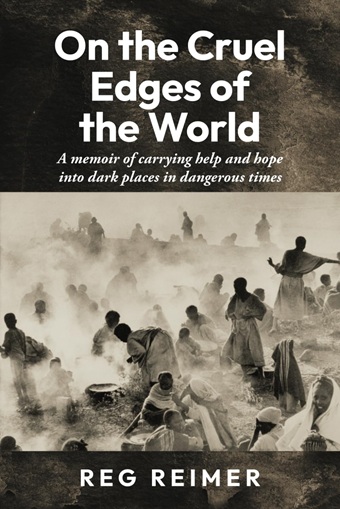
Version 1.0.0
I have introduced Reg Reimer’s book already, and still plan to write a more thorough review in the future. But here I just describe On the Cruel Edges of the World briefly before quoting some of the insights Reimer has gained over his many years of (very) active service.
An overview:
A missionary vocation set the stage for an extraordinary life of service for Reg Reimer [which] required him to be by turns an evangelist, a professor, a first responder, a church planter, a chief executive, a writer, a development worker, a peacemaker, an advocate and a spy!
It took him into the suffering caused by the major man-made and natural disasters of our time – in the Vietnam War, the Cambodian and the Rwanda genocides, the African famines, the Great Asian Tsunami.
There he partnered with the compassionate God in lifting up the destitute, the downtrodden and the persecuted, making their way “as best they could on the cruel edges of the world” (Heb. 11: 38 The Message).
These experiences led him to reflect deeply on human evil and human suffering, alongside the goodness and mercy of God.
He wrote about some lessons he has learned along the way. Near the end of the book, he states his continued “firm belief that Jesus provides the only way to eternal salvation.”
But his many experiences have modified his perspective:
The longer and deeper my walk with Jesus, both my understanding and the mysteries grow. My mind and soul are somewhat more settled after a time of study and contemplation on these matters, and my zeal to share the good news is undiminished.
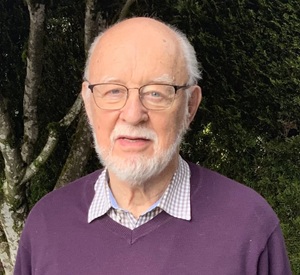
Reg Reimer
However . . .
As I examine such consequential and mysterious matters, I become acutely aware of my tiny humanness.
And ‘sharing the good news’ has become a broader mandate:
As essential as gospel proclamation is, I came to experience mission as more than verbal proclamation and calling for decision. Jesus said, “As the Father has sent me, so I send you.” How was he sent? He came proclaiming the establishment of the kingdom of God. This is the good news – that God is already in charge!
Abbotsford writer/pastor April Yamasaki wrote about the book on her When You Work for the Church site May 6:
On the Cruel Edges of the World is a memoir full of stories, careful observations, thoughtful questions, and much more. It’s not only a look back at one man’s missionary experience – for me, it’s an inspiring example that makes me think about my own life and ministry, and the life and ministry of the church.
She added an excerpt from his book about advocacy, based on his time in “dark places in dangerous times.”
- Darrell Whiteman: Crossing Cultures with the Gospel: Anthropological Wisdom for Effective Christian Witness (Baker Academic, 2024)
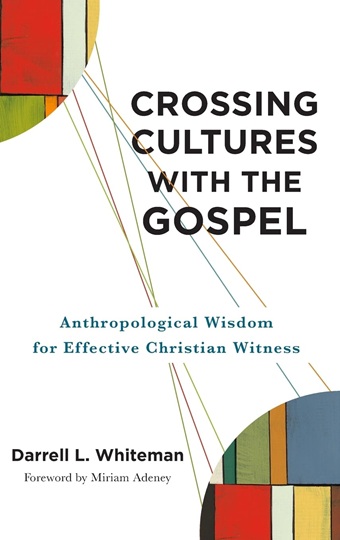
Version 1.0.0
Darrell Whiteman believes that every missionary is in need of “two conversions,” first to Christ as Lord and Saviour, and second in our awareness of their new situation:
We take our understanding of the gospel, as culturally conditioned as it is, and we develop a relationship with people who are different from us in their culture. We attempt to read the Bible through their eyes and to understand and interpret it from the perspective of their worldview, not our worldview.
When this begins to happen, there will no longer be just a one-way arrow pointing from the missionary communicator to the non-Christian receptor. Now arrows will go both directions because the missionary will learn many new things about God when they view life through the lens of their host culture.
Here is the publisher’s introduction to the book:
Drawing on 40 years of teaching and mission experience, leading missiological anthropologist Darrell Whiteman brings a wealth of insight to bear on cross-cultural ministry.
After explaining the nature and function of culture and the importance of understanding culture for ministry, Whiteman addresses the most common challenges of ministering across cultures.
He then provides practical solutions based on lived experience, helping readers develop healthy patterns so they can communicate the gospel effectively.
Issues addressed in Crossings Cultures with the Gospel include negotiating differences in worldview, the problem of nonverbal communication, understanding cultural forms and their meanings, and the challenge of overcoming culture shock.
Here are a couple of the obvious (to us) and at times cringeworthy examples of missionary ignorance that Whitehead notes:
- His own experience of seeing efforts to convince collectivist, community-oriented Solomon Islanders to understand the Four Spiritual Laws, prepared in an individualistic culture, to prepare and share their personal testimonies.
- He pointed to Presbyterian missionaries to the southern New Hebrides “who described their potential Melanesian converts in very negative terms. In . . . 1875, they noted, ‘We labour among very, very low and fearfully degraded races.'”
Sometimes it was more just a matter of assuming there was no sign of God’s work before they arrived: A useful review of the book in Christianity Today by emeritus anthropology professor Robert Canfield included this:
The book also mentions a missionary in Nigeria who learned an important lesson from a local elder on how his service was perceived. When the missionary exulted in having been sent to these people by God, the elder responded, “We are glad you have come, but it is our Igbo god Chukwu who sent you to us so we could learn more about God, now that you have told us about Jesus.”
Whiteman writes that God already has a witness in every culture “at every period of human history.” This makes the missionary project exciting and encouraging; as we see how the gospel becomes meaningful to another people, we “learn more about what God is doing in the world.”
A couple of things I would have liked to see:
- Some discussion of Hudson Taylor and the China Inland Mission, who famously dressed like the Chinese (to the extent of having men grow their hair into pigtails) and spoke to the people in their language as they bravely ventured into the interior. How successful were those efforts, from an anthropological point of view? This approach took great courage. As Alvyn Austin points out in a Christian History article, “In the gossipy colonial enclaves of Shanghai and Hong Kong, ‘going native’ caused outrage and hilarity.” These stories are still quite well known in Christian circles, so it would have been interesting to see them addressed.
- Some interaction with the work of Kenelm Burridge (1922 – 2019), former Department Head of the Department of Anthropology at UBC, who wrote the valuable 1994 book (republished by UBC Press in 2007), In the Way: A Study of Christian Missionary Endeavours. UBC Press.
Burridge, who was Catholic, stated in a YouTube video about the book in 2018:
I got fed up with anthropologists, my colleagues, who are always having a downer on missionaries. Missionaries were in the way . . .
My colleagues just wouldn’t listen to anything that one said about missionaries without saying, “There, you see, missionaries spoiled everything.” They were rivals really, you see, that was the point I’m trying to make. The anthropologists and missionaries were rivals.
Anthropologists didn’t try to make people do things, but they did try to understand them. And missionaries did the same thing, only they wanted to have a persuasive chat with any people they met. They learned the language, which is one thing a lot of anthropologists never did.
In their books, although one knew that they had been helped by missionaries – because in private they would say, yes well he was a great help to me – in public they would condemn the missionary for trying to make something else out of these people. Well, who wasn’t trying to make something else of these people . . .
To be fair, Whitehead had limited space (255 pages) and he did say:
Many early missionaries were excellent observers and contrary to the popular stereotype, they didn’t set out to destroy the culture of their host society. Because they wanted to tell people the story of Jesus, they gave time and attention to discovering and documenting the culture.
Some missionaries in the past did this exceedingly well, and in the process, they made significant contributions to ethnography and anthropology as well as enabling their ministry to be more effective and longer lasting.
He also refers to The Ways of the People: A Reader in Missionary Anthropology by Alan Tippett, a 700-page volume of ethnographic writing from 62 missionaries.
The key point, though, is that Crossing Cultures with the Gospel will be valuable to missionaries today. Whitehead writes:
You may wonder, hasn’t the missionary world already learned all of these anthropological principles and intercultural lessons? I wish I could say an unqualified yes, but I can’t.
As we move into the postcolonial era, and as the former mission fields are increasingly becoming a global mission force, I often see the same lack of cross-cultural understanding and awareness as was too often characteristic of previous generations of missionaries.
Confusing the gospel with their own culture or their own denomination’s interpretation of the gospel is a rampant problem everywhere I’ve observed cross-cultural ministry.
The world may have shrunk, cultural distinctives may “seem to be flattening out” and we may have better opportunities to learn about other cultures than did earlier missionaries – but missionaries still have so much to learn from other cultures, and from the anthropologists who immerse themselves in those cultures.
- Graham Joseph Hill: World Christianity: An Introduction (Cascade Books, 2024)
The publisher said of the book:
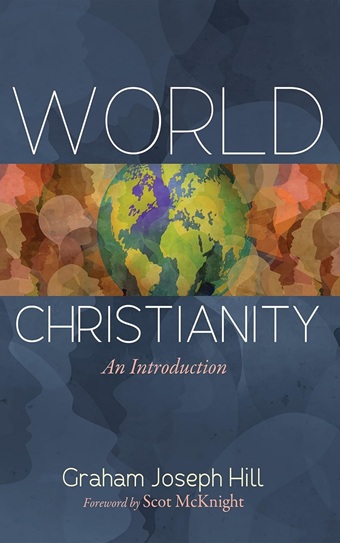
World Christianity: An Introduction provides an accessible introduction to the discipline, methodology and field of world Christianity.
< style=”padding-left: 40px;”>In this book, Graham Joseph Hill engages with more than 100 high-profile Majority World and First Nations Christian leaders to learn what they can teach the West about mission, leadership, hospitality, creation care, education, worship and more.
Hill challenges the Western church to move away from a Eurocentric and Americentric view of church and mission, and he calls for the church to engage with crucial paradigm shifts in world Christianity.
The future of the global church – including the churches in the West – exists in these global exchanges. World Christianity is an indispensable guide for the church as it navigates the unique global experiences of the twenty-first century.
At 518 pages, Hill’s book is not easy to describe briefly. Though the purpose is to introduce world Christianity, mission and missionaries receive a good deal of attention.
A good starting point would be to read his Facebook post June 29, 2024, not too long before World Christianity was published, asking ‘What is mission?’
He concludes:
We don’t have the luxury of designing our mission according to our preferences and tastes. We participate in God’s mission – we don’t have our own. We see the characteristics of that mission revealed in the mission of God in Scripture, from Genesis to Revelation.
Here are seven characteristics of Christian mission:
1. Proclamation of the Gospel: Sharing the message of Jesus Christ’s life, death and resurrection – and our salvation and restoration in him.
2. Disciple-Making: Teaching and nurturing followers of Jesus in all neighbourhoods and nations.
3. Social Justice: Working toward justice, peace and reconciliation in society.
4. Community Service: Serving others with love and compassion, meeting practical needs.
5. Creation Care: Caring for the environment as part of God’s creation.
6. Incarnational Living: Embodying Christ’s teachings and example within communities as sent and sending people.
7. Holistic Transformation: Aiming for the comprehensive transformation of people and societies in alignment with Christ’s teachings (recognizing that this is God’s work and we join with Christ as he, in the power of the Spirit, brings holistic change and transformation).
These characteristics are rooted in the Missio Dei, which recognizes that mission is primarily God’s work and that God invites the church to participate in God’s redemptive actions and plan.
In World Christianity, Hill introduces “the discipline, methodology and field of World Christianity,” spelled out in “seven paradigm shifts in world Christianity and their 13 expressions: renewing our mission and revitalizing our churches.”
The seven paradigm shifts are world Christianity methodologies, polycentricity, polyvocality, interculturality, integrality, pentecostality and glocality: “as a shorthand I call this holisticostal“:
So, what is holisticostal? It’s a theological concept that displays new patterns of interconnectedness, each one revealing the radiant beauty of God’s intentions for his people. It is the call to mission infused by the Spirit, centered in Christ, grounded in the Scriptures and embracing the polyphony of global voices in a dynamic conversation.
He clearly believes that any sense of Western superiority or domination has more than worn out its welcome.
The 13 expressions of the seven holisticostal paradigm shifts are: contextualizing mission; liberating people; showing hospitality; embracing the spirit; caring for creation; living ethically; transforming neighbourhoods; inculturating faith; devouring Scripture; renewing education; practicing servantship; recovering community; and developing spirituality and discipleship.
Like the other writers covered here, Hill has read and consulted very widely. One valuable feature in his book are appendices which link to many of these sources, especially:
- Majority world, diaspora, first nations and Indigenous thinkers consulted in World Christianity: An Introduction. He draws on a wide range of theological traditions – Orthodox, Catholic, Evangelical, etc; he clearly has a real appreciation for Liberation Theology and Integral Mission – from all over the world. Go here for 104 brief biographies.
- The Global Church Project video series. An amazing selection of 152 videos with Majority World, Indigenous and diaspora Christian leaders. Among them Charles Ringma and Michael Goheen, but also including many of the people I’ve covered in my Christianity: a missionary religion series and other mission articles.
What the book does lack is an index, which really should have been included.
- Lisa Rodriguez-Watson, national director, Missio Alliance;
- Peter C. Phan, chair of Catholic social thought, Georgetown University;
- Scott Moreau, professor emeritus of intercultural studies, Wheaton College;
- Amos Yong, professor of theology and mission, Fuller Seminary;
- Scot McKnight, chair of New Testament, Northern Seminary;
- Todd M. Johnson, distinguished professor of mission and global Christianity, Gordon-Conwell Theological Seminary;
- Peter Walker, principal, United Theological College;
- Dorottya Nagy, professor of theology and migration, Protestantse Theologische Universiteit.
Hill argues for “shifting from merely missional approaches to intercultural ones.” But he does not advocate for watering down missional work:
But let us not deceive ourselves into thinking that adopting an intercultural approach somehow diminishes our commitment to missional theology. Quite the contrary, it heightens, enriches and vivifies it.
A genuinely missional church is not a cultural imperialist, exporting a pre-packaged gospel to other lands. Instead, it is a humble learner, an attentive listener, eager to hear the word of God spoken afresh in the tongues of brothers and sisters from around the globe.
It acknowledges, with humble joy, that the missio Dei is not about God endorsing our mission but about us joining God’s mission, which, astonishingly, has been unfolding through diverse cultures long before we arrived on the scene.
Like Charles Ringma, Hill received the Medal of the Order of Australia last summer.
- Klaus Koschorke: A Short History of Christianity Beyond the West: Africa, Asia and Latin America, 1450 – 2000 (Brill, 2025)
The publisher writes of the book:
Today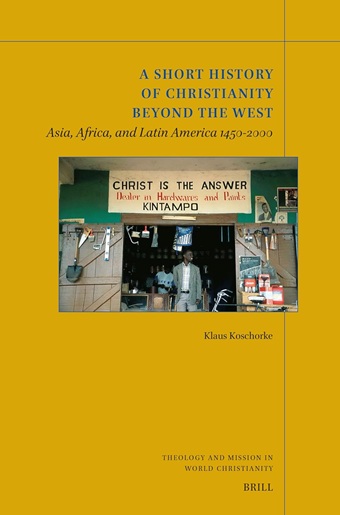 , the majority of the world’s Christian population lives in the Global South. Knowledge of their history is therefore indispensable. </p >
, the majority of the world’s Christian population lives in the Global South. Knowledge of their history is therefore indispensable. </p >
A Short History of Christianity Beyond the West offers a compact [374 page] and vivid overview of the history of Christianity in Asia, Africa and Latin America since 1450, focusing on diversity and interdependence, local actors and global effects.
Maps, illustrations and numerous photos as well as continuous references to easily accessible source texts support the reader’s own reading and its use in various forms of academic teaching.
Special bonus material including 250 photos taken by the author can be accessed here: https://doi.org/10.6084/m9.figshare.27623484.v2
Klaus Koschorke is professor emeritus at Munich University LMU (Chair‚ Early and Global History of Christianity). He has published widely on the history of Christianity in the Global South.
A useful review of the German version of the book by Kevin Ward in the International Bulletin of Missionary Research states:
Koschorke has developed an intellectual approach to the study of Christian history which emphasizes the ‘polycentric’ nature of Christianity. This develops Lamin Sanneh’s emphasis on the ‘translatability’ of Christianity: the importance of hearing the Bible in one’s own tongue means that the Church must embed itself in the particular cultures it encounters.
The Christian message both affirms and challenges culture. It can never simply be transplanted from outside. Foreign missionaries have their importance and cannot be ignored. Yet too often they demonstrate the dangers of attempting to impose an alien culture and civilization on ‘the Other.’
But many foreign missionaries have also evidenced an ability to enter into, and be transformed by, the new culture into which they are immersed. For them it was a prerequisite to making the Christian message meaningful and attractive.
Koschorke shows that the main emphasis for the historian must be on those who received and conveyed the Christian message from within their own societies: as translators, interpreters, mediators, evangelists, thinkers and theologians to their own people.2
Koschorke’s other important concept is that of ‘networking,’ by which Christian communities in the global South established relationships with other Christian groups in the South, and thus are strengthened to challenge the hegemony of the West.
The inter-relationships between Christian communities in the Global South are highlighted throughout the book. The book follows a chronological order so that Asia, Africa and Latin America are not treated in isolation. Cross-currents between the different regions of the South emerge strongly, not only in recent times but throughout the history of Christianity in these regions.
An earlier textbook of sources has been translated into English: Klaus Koschorke, Frieder Ludwig and Mariano Delgado (editors), A History of Christianity in Asia, Africa and Latin America: A Documentary Sourcebook, Grand Rapids: Eerdmans, 2007 (originally published in German in 2004). This gives a wide selection of relatively short, highly illuminating, texts from both missionary and indigenous sources. The present work refers specifically to these texts.
Go here for the full review. And here for a detailed Table of Contents.
- Stephen B. Bevans: Community of Missionary Disciples: The Continuing Creation of the Church (Orbis Books, 2024)
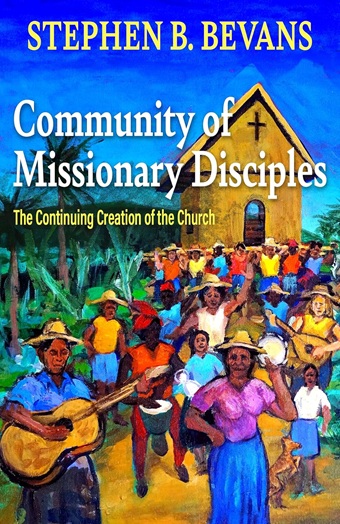 Stephen Bevans introduces Community of Missionary Disciples with three telling quotes:
Stephen Bevans introduces Community of Missionary Disciples with three telling quotes:
- The pilgrim church is missionary by its very nature. – Ad Gentes 2
- Evangelizing . . . is the grace and vocation proper to the church, its deepest identity. – Evangelii Nuntiandi 14
- The Church which goes forth is a community of missionary disciples. – Evangelii Gaudium 24
His first sentence reads:
This book is an attempt to develop a theology of the church that is thoroughly missionary – rooted in God’s triune, missionary nature, and participating in that nature through baptism.
In the conclusion, he adds:
The church, we emphasized time and time again in this book, does not have a mission. Rather the mission – of the Triune God – has a church.
The publisher says of Community of Missionary Disciples:
In this comprehensive ecclesiology through a missionary lens Stephen Bevans unpacks the profound Catholic conviction that the church is missionary by its very nature as he considers what it means for the church to be on mission, in community, and together in discipleship.
Bevans is Professor of Mission and Culture at Catholic Theological Union in Chicago and has written many books. Like Ringma, he spent time a young man teaching theology in the Philippines. He is co-author with Roger P. Schroeder of Prophetic Dialogue: Reflections on Christian Mission Today and also serves as editor of Mission Studies and contributing editor of International Bulletin of Missionary Research. In 2021 Bevans was honored with the Lifetime Achievement Award from the American Society of Missiology.
He focuses much of his attention on the Catholic world, but he is generous to other streams of the church, and regularly quotes and refers to their representatives. For example:
- Mennonite missiologist Wilbert Shenk: mission is prior to the church;
- former Archbishop of Canterbury Rowan Williams: mission is finding out where the Triune God is at work and joining in;
- missiologist and churchman Lesslie Newbigin speaks of the church as a ‘foretaste’ of God’s reign.
He is not hesitant to politely critique them though:
Much of missiology has been pioneered by Protestant, evangelical and – in the last several decades – Pentecostal thinkers, and so there is not always the sense of the high ecclesiology that Catholics need to bring to it.
One reviewer (James Butler) from the (Anglican) Church Mission Society wrote:
[A]t times I would like to have heard a more critical voice. While it is great to have the diversity of voices, I couldn’t help thinking that voices which he engaged with together, might have quite robust critiques of each other, and perhaps this kind of conversation would have benefitted the book.
For example, Christopher Wright’s [Langham Partnership, Lausanne Movement] framing of the missio Dei is distinct from, say, Pope Francis or the conversation in the missional church literature and these differences could have been explored.
Go here for the full review.
Roger Schroeder, Chair of Mission and Culture at Catholic Theological Union in Chicago, wrote: “Community of Missionary Disciples is truly a magnum opus of Stephen Bevans as he presents an in-depth and creative missionary ecclesiology and ecclesiological missiology.”
The ‘Christianity: a missionary religion’ series:
This is the 11th in a series of articles focused on Christianity: a missionary religion. Each one looks at several books.
• Introduction
1. History of Missions
2. State of World Christianity
3. Specific Areas: Africa
4. Specific Areas: Asia
5. Specific Areas: Latin America
6. Not So Good News
7. New Approaches to Missions
8. Women
9. Specific Areas: Asia
10. Imperialism / Colonialism

Flyn, these are wonderful book recommendations. I appreciate this very much and believe that churches and ministers will be well-served through these resources. Thank you for your article here and the others in the series!
Thank you Winnie. There are some great books coming out these days about missions and world Christianity.
There is an awful lot in this group of these book review to take in, but I stopped at something that speaks powerfully to me and my work with Rohingya people. It is Graham Hill’s thoughts:
“A genuinely missional church is not a cultural imperialist, exporting a pre-packaged gospel to other lands. Instead, it is a humble learner, an attentive listener, eager to hear the word of God spoken afresh in the tongues of brothers and sisters from around the globe.
“It acknowledges, with humble joy, that the missio Dei is not about God endorsing our mission but about us joining God’s mission, which, astonishingly, has been unfolding through diverse cultures long before we arrived on the scene.”
In my attempt to present Christ to non-Christian cultures, I have found the best first introduction is to view him as he was viewed by those who first experienced him when his ministry started, before anyone knew of him as the son of God and before the crucifixion happened. Just Jesus. Who he was and what he offered. And especially who he was for those the world wanted nothing to do with – those who were rejected by the world.
Knowing that Jesus, with his unconditional love for all – no matter where you come from, who you are or how you worship – is a way to find healing, emotionally and spiritually.
Knowing Jesus in this way will not transform your religion; it will not take away from it, but it will add to it. And if all religions were to accept this Jesus with his unconditional love at its foundation, I believe there would be greater peace in this world, without the vying with this religion and that one, for superiority.
When our Christian faith sets itself up as superior to others, it lacks humility and does not follow the example Jesus set for us. And aren’t we supposed to be following Jesus, after all?